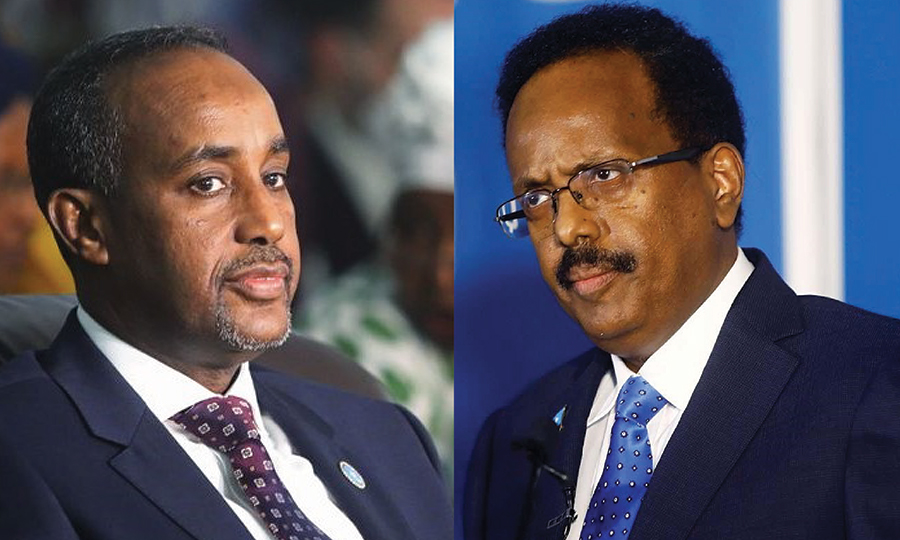EXPLAINER: The Farmaajo-Roble row and journey to a truce

By Yussuf Osman
GOOBJOOG NEWS|MOGADISHU: EXPLAINER: Outgoing President Mohamed Farmaajo and Prime Minister Mohamed Roble announced a deal Thursday night ending close to three months of ice-cold relations, antagonism and public barbs as the country dragged through an uncertain and volatile transitional period.
The deal, which came after two days of fresh meetings between the two leaders which followed a lull of about a month was largely a trade-off of contested public appointments. Farmaajo had his way in affirming Yasin Abdullahi Mohamud (Farey) as intelligence boss while Roble’s Security Minister appointee Abdullahi Mohamed Nur retained his position.
Former prisons boss General Bashir Gobe who had been picked by Roble to head the National Intelligence and Security Agency (NISA) will now be appointed a state minister. The deal also saw Roble’s demand for the case of the deceased female spy agent Ikran Farah honoured. The case, the communique read, will be settled through the courts.
HOW WE GOT HERE
Relations between Farmaajo and Roble had been volatile since he (Roble) took charge of the management of elections in May following failed talks between Farmaajo and the opposition group, Council of Presidential Candidates. The CPC comprises 15 opposition presidential candidates. However, that relationship hit the rock bottom following the announcement by NISA on September 2 that Farah, who had been missing since June 26 was dead and that the militant group Al-Shabaab had kidnapped and killed her. However, the group immediately rubbished the allegations noting it was ‘shocked’ by the claims.
The announcement unveiled a roller coaster of events that reverberated through the government as Farmaajo and Roble went on the warpath. Roble spoke about the matter and demanded answers from then NISA boss Fahad Yasin in 48 hours while Farmaajo went mum to date. Yasin would shortly take off to Turkey leaving his political protégé -Farmaajo to square off with Roble.
In effect, therefore, the deal on the Ikran case served to appease the public but in reality, those responsible for the agent’s death may have a field day after all.
Roble sacked Yasin upon the lapse of the 48 hours but Farmaajo fired back noting Yasin was there to stay. In Yasin’s place, Roble picked General Gobe, kicked out Hassan Hundubey as Security Minister and brought in Abdullahi Nur. In a move to ease off public pressure, Farmaajo acceded to Yasin’s removal but was not about to let go of the agency. He picked Yasin Farey who immediately secured way into the agency before Gobe could drive in.
Now there were two intelligence bosses, tensions within the agency and two leaders claiming the high moral ground. Amid the stand-off, public pressure was piling on Farmaajo over the killing of the female agent amid accusations that his henchman, Yasin now safely tucked somewhere in Turkey, per reports, was an accomplice in the murder. Farmaajo too was accused of cover-up and attempts to dissolve the case by reportedly pushing for a ‘blood-money’ deal. The embattled former intelligence boss who is credited for shepherding Farmaajo into power in 2017 thanks to his deep Qatari links was subsequently returned to Villa Somalia as National Security Advisor.
The row between Farmaajo would further spiral attracting rebuke from the UN Security Council and other key donors who demanded an end to the feud. Galmudug and South West presidents, Ahmed Qoorqoor and Abdiasis Lafta Gareen, both of whom received Villa Somalia’s bid to become presidents in their respective states stepped in to reconcile the two feuding leaders but Qoorqoor would later pull out accusing the Farmaajo side of ‘dishonesty’. However, Lafta Gareen stood by until a deal was reached.
THE QATARI FACTOR
On October 4, PM Roble jetted off to Qatar in a rare visit given the Gulf nation’s support for the Farmaajo-Yasin axis. Though the PM’s office said the visit focused on bilateral issues, sources privy to the talks said the Qatari leader Sheikh Tamim Al-Thani’s sole objective for the meeting was to push for a dialling down of tensions. Indeed after the PM’s return from Qatar, there has been little activity and an end to the public statements.
WHAT THE DEAL MEANS
The new détente is crucial in securing a united front in the remaining phase of the elections. Clan elders are expected to soon start the lengthy process of picking the 27,775 delegates who will elect MPs. A joint sitting of the Lower and Upper Houses of Parliament will subsequently pick a new president. However, given the logistical and oft rigorous selection process of clan delegates and election of MPs, the country will most likely not get a new president this year effectively handing Farmaajo a one year extended stay in office. Nonetheless, a sync of minds between Farmaajo and Roble is important in coordinating the monumental tasks ahead towards a smooth transition especially in light of mounting Al-Shabaab attacks.
On the Ikran Farah case, prospects of prosecution are very slim. Even though the two sides elected to have the case disposed of in court, the fact that Farmaajo’s man will be heading NISA means investigations will return no water-tight case for prosecution if at all they will proceed. In effect, therefore, the deal on the Ikran case served to appease the public but in reality, those responsible for the agent’s death may have a field day after all.